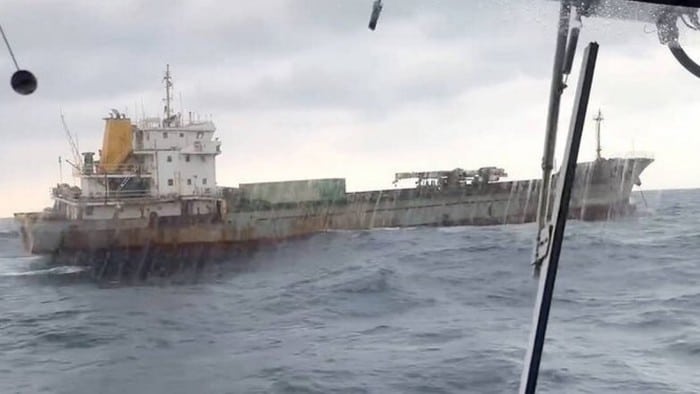[adrotate group="2"]
Taiwan has created a list of 52 Chinese-owned vessels that fly flags of convenience, which will be monitored and inspected as part of efforts to regulate a rapidly expanding “shadow fleet” that raises global security issues.
This action comes in response to the significant rise in older ships evading scrutiny and concealing their identities through misleading signaling. While much of the focus internationally has been on Russia’s use of these vessels to export oil in violation of sanctions related to its conflict with Ukraine, the number of such ships has increased beyond just tankers, leading to growing maritime and national security threats to coastal nations.
Taipei initiated its stricter enforcement after a dilapidated Chinese-owned freighter was implicated in the severing of one of its underwater cables earlier this month, following similar occurrences involving ships from China and Russia in the Baltic Sea.
The new regulatory measures specifically target cargo ships operating under the flags of Cameroon, Tanzania, Mongolia, Togo, and Sierra Leone. The owner companies of these vessels are based in mainland China, Hong Kong, or Macau, as highlighted in the blacklist.
A coastguard official from Taiwan stated, “The cable-cutting incident highlighted the dangers posed by substandard vessels. This is a concern for all coastal nations, and we must uphold our responsibilities as a port state. Furthermore, we face additional risks arising from China.”
Beijing considers Taiwan part of its territory and has expressed intentions to annex it by force if there is prolonged resistance to unification. The Taiwanese government is concerned that Chinese-owned ships might be employed for “greyzone” tactics that operate below the threshold of outright conflict, as China often incorporates commercial vessels into military maneuvers and utilizes fishing boats as militia to assert contested maritime claims.
Cameroon, Tanzania, Mongolia, Togo, and Sierra Leone allow ship owners to register vessels without being based in those countries. Ship owners frequently opt for these flags to minimize expenses, avoid stricter safety regulations, and evade rigorous oversight in their home nations.
Taipei is concentrating on these five countries, as vessels flagged from these nations frequently exhibit problematic documentation, violate maritime safety or labor laws, or bypass sanctions, according to the data from a regional multilateral group for port state control.
Although Taiwan is not part of the organization that compiles lists of concerning ships due to Chinese opposition, it managed to obtain the information through unofficial channels and subsequently refined the list to focus on vessels owned by Chinese interests.
Taiwan has identified 15 of the 52 ships as threats due to their presence in its territorial waters for 15 days or longer over the past year. Among these, the ship suspected of severing the cable is classified as a “high threat,” while four others are assessed as medium threats and ten as posing some level of threat.
Recently, the coastguard conducted its first inspection of a ship under this new regulatory framework, boarding the Bao Shun, a 20-year-old freighter flagged in Mongolia and owned by a Hong Kong-registered company. This vessel had been stationary near Taiwan for the previous two months and is categorized as a medium threat. No illegal documents, contraband, or cable-cutting tools were found onboard, but the coastguard instructed it to leave Taiwanese waters.
Earlier this month, a subsea cable operated by a global telecom consortium was severed just off Taiwan’s northern coast. The government linked the incident to another freighter, the Shunxing39, flagged in Cameroon, which had been repeatedly navigating the area for at least a month. This ship, officially registered as Xing Shun 39 in Tanzania, has reportedly altered its identity multiple times within the past year.
Prior to the cable-cutting incident, the vessel had used various maritime mobile service identities, highlighting troubling patterns of deceptive practices that contradict standard shipping operations. Such manipulations are often employed by vessels engaged in activities they wish to conceal.
Taiwanese security officials have noted a dramatic increase in the number of vessels categorized as “shadow vessels” in the region over the last two years. These ships primarily transport frozen products and other miscellaneous cargo, often relying on smaller vessels to transport the cargo at sea, with an operational model focused on minimizing costs by avoiding necessary repairs and infrequently entering ports.
Analysts indicate that this trend reflects a broader rise in shadow vessels worldwide, particularly since Russia began utilizing them to ship oil in violation of international sanctions.
photo credit: www.ft.com
[adrotate group="2"]





